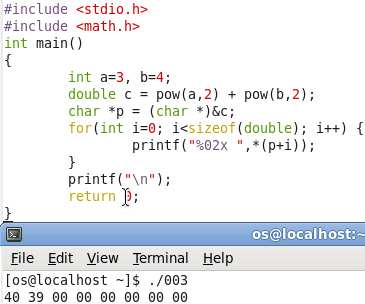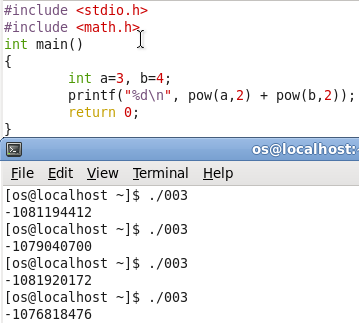C语言辨析——深入理解格式字符的用法
发布时间:2024年01月14日
1. 问题
下面程序为什么的输出结果为什么不是25而是0?问题出在哪?
#include <stdio.h>
#include <math.h>
int main()
{
int a=3,b=4;
printf("%d\n",pow(a,2)+pow(b,2));
return 0;
}2. 分析
函数pow的返回类型是double,因此表达式pow(a,2)+pow(b,2)的类型是double。而printf函数中的输出格式字符是“%d”,其对应的表达式应该是int类型。目前我们所用计算机系统大多数以8字节存储double类型数据,以4字节存储int类型数据,因此,可以得出结论:由于输出格式字符与表达式类型不匹配而产生错误输出。
3. 改正
(1)修改输出格式字符为“%f"或“%lf"。
(2)利用强制转换类型,将double类型的表达式转换为int类型。
修改后的程序如下所示。
#include <stdio.h>
#include <math.h>
int main()
{
int a=3,b=4;
printf("%d\n",pow(a,2)+pow(b,2)); // error
printf("%f\n",pow(a,2)+pow(b,2)); // (1)
printf("%lf\n",pow(a,2)+pow(b,2));// (1)
printf("%d\n",(int)(pow(a,2)+pow(b,2)));// (2)
return 0;
}4. 进一步分析:为什么错误输出的结果是0
我们来分析表达式pow(a,2)+pow(b,2)的存储值,下面程序可以输出该表达式所占8个字节的值。
#include <stdio.h>
#include <math.h>
int main()
{
int a=3,b=4;
double c = pow(a,2)+pow(b,2);
char *p = (char *)&c;
for(int i=0; i<sizeof(double); i++) {
printf("%02x ",*(p+i));
}
return 0;
}输出结果是:
00 00 00 00 00 00 39 40
在错误的程序中,输出格式字符"%d"对应前4个字节,它们的值都是00,因此,输出结果为0。如果再输出一个"%d"会是多少呢?应该是0x40390000,即十进制的1077477376。我们通过程序来验证。
#include <stdio.h>
#include <math.h>
int main()
{
int a=3,b=4;
printf("%d\t%d\n",pow(a,2)+pow(b,3));
return 0;
}![]()
注:以上结论是在Dev C++ 5.11下调试的结果,在其他编译器下是什么结果就不知道了。在大端系统中,会是什么情况呢?下面以截图展示。

图?大端序存储

图?运行结果是个随机值
与小端序有很大不同,
可见用错格式字符,问题很严重!

参考文献:
[1]李红卫,李秉璋.?C程序设计与训练(第四版)[M],大连,大连理工大学出版社,2023.
[2]https://pan.baidu.com/s/17ZXphwqySNIsIgcGtYMjvg?pwd=lhwc
文章来源:https://blog.csdn.net/lhwhit/article/details/135579243
本文来自互联网用户投稿,该文观点仅代表作者本人,不代表本站立场。本站仅提供信息存储空间服务,不拥有所有权,不承担相关法律责任。 如若内容造成侵权/违法违规/事实不符,请联系我的编程经验分享网邮箱:chenni525@qq.com进行投诉反馈,一经查实,立即删除!
本文来自互联网用户投稿,该文观点仅代表作者本人,不代表本站立场。本站仅提供信息存储空间服务,不拥有所有权,不承担相关法律责任。 如若内容造成侵权/违法违规/事实不符,请联系我的编程经验分享网邮箱:chenni525@qq.com进行投诉反馈,一经查实,立即删除!
最新文章
- Python教程
- 深入理解 MySQL 中的 HAVING 关键字和聚合函数
- Qt之QChar编码(1)
- MyBatis入门基础篇
- 用Python脚本实现FFmpeg批量转换
- 基于ssm校园二手交易平台论文
- 图形化编程:以Scratch引领少儿编程思维启蒙之旅
- Vue+Element(el-upload+el-form的使用)+springboot
- pyecharts绘制柱状图
- 关于可变长数组 ArrayList
- PLC编程中ST语言操作符的使用方法
- 一文详解FP独立站引流全攻略
- VB6.0调用dll报错:DLL调用约定错误
- 针对 IDOC 解析函数 IDOC_INPUT_CREDITOR升级后相关报错 解决办法记录
- 实时数据获取:抖音API在电商中的应用与影响